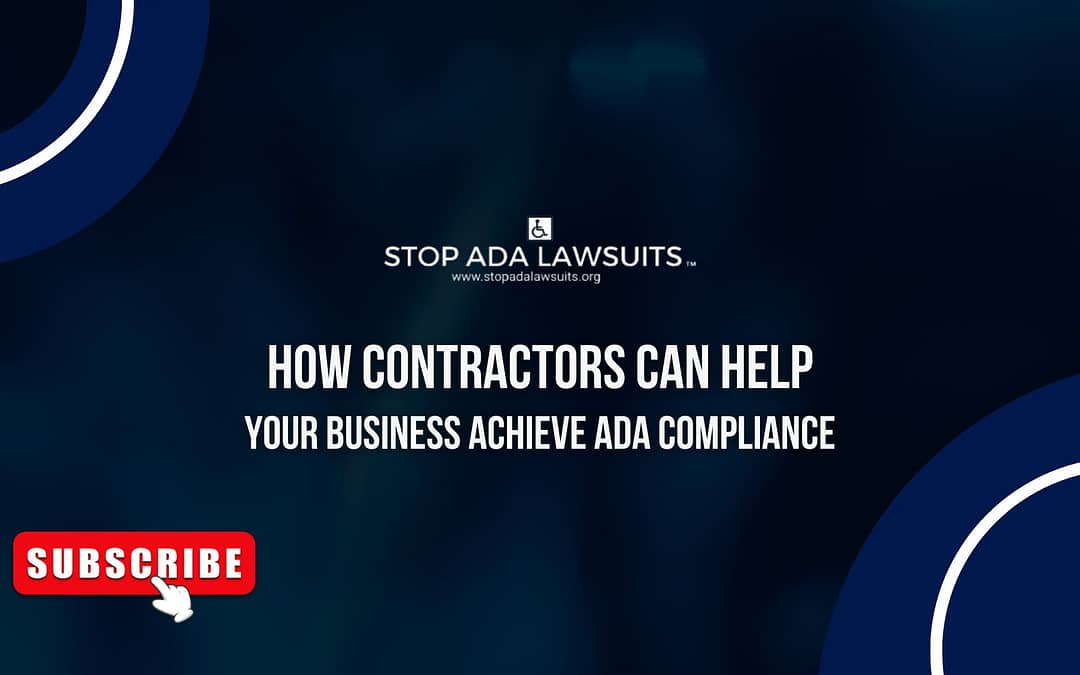The Americans with Disabilities Act (ADA) requires businesses to ensure accessibility for individuals with disabilities, covering both physical spaces and digital environments. Achieving compliance can be daunting, especially for small businesses that may not fully understand the requirements. Contractors specializing in ADA compliance play a critical role in helping businesses meet these standards. Here’s how they can support you in avoiding costly lawsuits and providing a welcoming environment for all customers.
Table of Contents
Toggle1. Expertise in ADA Requirements
ADA regulations are detailed and specific, covering everything from parking spaces to restroom accessibility. Contractors who specialize in ADA compliance are well-versed in these standards and can help identify potential problem areas.
Key Areas Contractors Focus On:
- Parking Lots: Ensuring properly marked accessible parking spaces, ramps, and signage.
- Entrances and Exits: Installing ramps, automatic doors, or lowering thresholds to meet accessibility guidelines.
- Restrooms: Adjusting stall sizes, installing grab bars, and ensuring proper sink and mirror heights.
Their expertise allows businesses to confidently navigate the often complex ADA rules, saving time and avoiding mistakes.
2. Conducting an ADA Audit
An ADA compliance contractor can perform a comprehensive audit of your premises to identify violations. This evaluation typically includes:
- Measurements of door widths, slopes, and counter heights.
- Evaluating signage for proper size and placement.
- Assessing paths of travel to ensure they are wide and clear of obstructions.
These audits help create a roadmap for necessary improvements, prioritizing the most critical areas to minimize legal risks.
3. Providing Cost-Effective Solutions
One of the biggest challenges for businesses is managing the cost of ADA compliance updates. Contractors can provide budget-friendly recommendations and phased improvement plans, allowing businesses to spread out expenses.
Examples of Budget-Friendly Solutions:
- Installing temporary ramps while planning for permanent fixtures.
- Re-striping parking lots to add accessible spaces without major renovations.
- Adding grab bars or accessible hardware instead of overhauling entire restrooms.
By working with a contractor, businesses can avoid unnecessary expenses while still meeting ADA requirements.
4. Designing and Executing ADA-Compliant Construction
When new construction or renovations are needed, contractors ensure every aspect of the project adheres to ADA standards. This includes:
- Choosing compliant materials and designs.
- Supervising construction to maintain compliance throughout the process.
- Performing post-construction evaluations to ensure the finished product meets requirements.
Hiring a contractor with ADA expertise reduces the risk of errors that could lead to non-compliance lawsuits.
5. Documentation and Certifications
Many ADA compliance contractors provide documentation of the work performed, which can serve as evidence of your efforts to meet ADA standards. This is particularly helpful in the event of a lawsuit or inspection, as it demonstrates your proactive approach to accessibility.
6. Staying Updated on Changing Regulations
ADA standards are periodically updated, and what was compliant a few years ago may no longer meet current requirements. Contractors keep up with these changes, ensuring that the work they perform aligns with the latest guidelines.
Choosing the Right Contractor
Not all contractors are equally equipped to handle ADA compliance projects. When hiring, look for professionals with:
- Experience: Ask for references and examples of previous ADA compliance projects.
- Certifications: Some contractors hold specific certifications related to accessibility and ADA standards.
- Knowledge of Local Regulations: In addition to federal ADA guidelines, contractors should be familiar with state and local accessibility codes.
The Bottom Line
Achieving ADA compliance is essential not just for avoiding lawsuits but also for creating an inclusive environment for all customers. Contractors specializing in ADA compliance are valuable partners in this process, helping businesses identify violations, implement cost-effective solutions, and ensure compliance with current standards.
By investing in professional support, you protect your business from legal risks and show your commitment to accessibility, building trust and loyalty with a wider customer base. For expert advice and resources tailored to your business, visit StopADA Lawsuits today! Schedule a free consultation to learn how we can help you avoid costly lawsuits and achieve ADA compliance.

